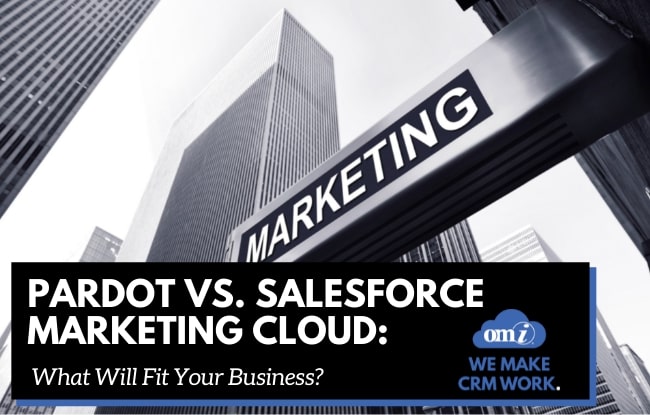In the discussion around marketing automation, these are two of the most well-known and influential platforms you will probably hear about. A casual glance at their features and capabilities might seem to suggest that they perform the same role.
Both are Salesforce products, so you would also be forgiven for assuming one is part of the other, or that one might be a sort of enterprise version and the other, a more scaled-down offering meant for smaller organizations.
In truth, the two are different pieces of software, meant to occupy different spaces in business, and offering features that are meant to serve different types of organizations with different goals in mind.
In this article, we aim to answer some of the most common questions people want answered when making the Pardot vs Marketing Cloud choice. For example, is Pardot part of Marketing Cloud? Is Pardot B2C or B2B? Which one would work best for you and your organization?
Read on to find out.
Difference Between Pardot and Marketing Cloud
Before we jump into exactly what differentiates these two pieces of software, let’s first have a look at what they are and who they are meant to serve. They both provide platforms for automation, both aggregate data and produce digital insights, and offer options for integration with the Salesforce CRM. The list of similarities goes on.
Salesforce Marketing Cloud
This is a platform that is designed to enable the setup and administration of tailored customer experiences for clients. Using this platform you can build customer journeys spanning different platforms. So a client can navigate across different platforms and interact with the business through social media, paid advertising, the business’ website, and other touchpoints.
From the customer’s point of view in relation to your product, the journey across these platforms should still feel seamless. Salesforce Marketing Cloud provides tools that make it easier to build such a setup and make the most of it. The idea is both to improve the experience of leads as they explore your offering and become prospects that eventually make a purchase, and also to make setting up this journey easier for marketing staff.
Pardot
Pardot has similar aims but with a focus on B2B marketing. It is designed to foster more cohesive collaboration between marketing and sales teams. It provides marketing automation that enables you to send emails based on parameters you can set – like certain interactions for example. You can evaluate prospects and rank them, and adopt a data-driven approach to messaging. The software features a whole range of tools to help you achieve this. This includes advanced features like Artificial Intelligence that can evaluate and interpret the behavior of leads and prioritize them, or tools that monitor your ROI and even your competitors.
B2B or B2C?
Although these two solutions are positioned as B2B and B2C, their capabilities can, in actual fact, be of great benefit even to companies that do not necessarily fit precisely one of those categories. The decision to go with either Marketing Cloud or Pardot should be made based on what functionality is most likely to serve your marketing objectives and sales operations well. So examining your existing setup, what channels you are active on, and what your buyer’s journey encompasses, would be the best compass to show you which direction to take.
Salesforce Marketing Cloud vs. Pardot: Comparison Table
| Pardot | Marketing Cloud | |
| Main Product Descriptions | B2B Marketing Automation
on the World’s #1 CRM |
Build and manage personalized customer journeys. |
| Similar Customer Journey Features | Streamlined Lead Management:
Tool that segments leads, ranks them, and automates the delivery of dynamic content to them |
Journey Builder:
For the automation of customer interactions across different platforms. |
| Similar Content Creation Features | Smarter Lead Generation:
Builders for landing pages, forms, and social media posts to improve the quality of leads your content generates |
Content Builder:
With intuitive drag and drop tools, and smart algorithms, you can easily design and predict content that will fit customer preferences. |
| Similar Email Marketing Tools | Intuitive Email Builder using templates and visual editor with options for automation | Email Studio:
Has drag-and-drop segmentation tools to refine lists, also has automation tools. |
| Different Levels Of Salesforce Integration | Closer interoperability with Salesforce, interaction with Salesforce entities like leads is generally possible. | Separate platform that uses add-ons to communicate with and seamlessly exchange information with the Salesforce platform. |
| Different Software Setups | Pardot is a single application which can be extended to higher tiers for more specialized functionality | Module-based setup where you pay for modules that carry out specific functions. |
So What to Choose: Marketing Cloud or Pardot?
When making the Salesforce Marketing Cloud vs Pardot decision, the deciding factor should be the setup of your business and your overall marketing and sales goals.
Although Pardot is positioned as a B2B platform and Marketing Cloud as B2C, companies in either sphere stand to benefit from one software just as much as the other. With the powerful features that both platforms offer, it is entirely possible that a B2B company, depending on the nature of their operations and their marketing strategy, might opt for Salesforce Marketing Cloud and not Pardot.
Therefore, rather than simply picking the label that you feel best fits your business model, you should instead examine your current setup and goals and then choose the solution that best aligns with them.
